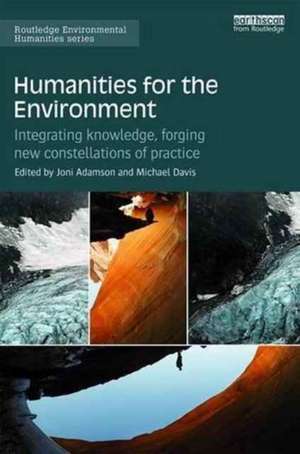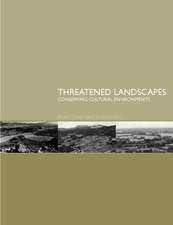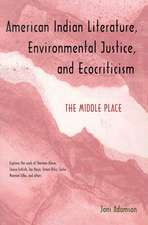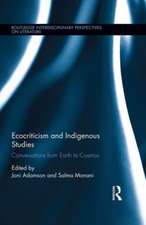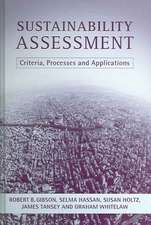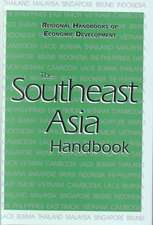Humanities for the Environment: Integrating knowledge, forging new constellations of practice: Routledge Environmental Humanities
Editat de Joni Adamson, Michael Davisen Limba Engleză Hardback – 15 noi 2016
Humanities for the Environment showcases how humanists are working to 'integrate knowledges' from diverse cultures and ontologies and pilot new 'constellations of practice' that are moving beyond traditional contemplative or reflective outcomes (the book, the essay) towards solutions to the greatest social and environmental challenges of our time. With the still controversial concept of the 'Anthropocene' as a starting point for a widening conversation, contributors range across geographies, ecosystems, climates and weather regimes; moving from icy, melting Arctic landscapes to the bleaching Australian Great Barrier Reef, and from an urban pedagogical 'laboratory' in Phoenix, Arizona to Vatican City in Rome. Chapters explore the ways in which humanists, in collaboration with communities and disciplines across academia, are responding to warming oceans, disappearing islands, collapsing fisheries, evaporating reservoirs of water, exploding bushfires, and spreading radioactive contamination.
This interdisciplinary work will be of great interest to scholars in the humanities, social sciences, and sciences interested in interdisciplinary questions of environment and culture.
| Toate formatele și edițiile | Preț | Express |
|---|---|---|
| Paperback (1) | 415.24 lei 6-8 săpt. | |
| Taylor & Francis – 28 iun 2018 | 415.24 lei 6-8 săpt. | |
| Hardback (1) | 1113.12 lei 6-8 săpt. | |
| Taylor & Francis – 15 noi 2016 | 1113.12 lei 6-8 săpt. |
Din seria Routledge Environmental Humanities
-
 Preț: 295.41 lei
Preț: 295.41 lei -
 Preț: 289.52 lei
Preț: 289.52 lei -
 Preț: 302.46 lei
Preț: 302.46 lei -
 Preț: 303.89 lei
Preț: 303.89 lei -
 Preț: 295.00 lei
Preț: 295.00 lei -
 Preț: 288.30 lei
Preț: 288.30 lei -
 Preț: 386.32 lei
Preț: 386.32 lei -
 Preț: 340.65 lei
Preț: 340.65 lei -
 Preț: 281.14 lei
Preț: 281.14 lei -
 Preț: 310.51 lei
Preț: 310.51 lei -
 Preț: 280.72 lei
Preț: 280.72 lei -
 Preț: 369.99 lei
Preț: 369.99 lei -
 Preț: 288.72 lei
Preț: 288.72 lei -
 Preț: 303.89 lei
Preț: 303.89 lei -
 Preț: 326.78 lei
Preț: 326.78 lei -
 Preț: 311.41 lei
Preț: 311.41 lei -
 Preț: 288.38 lei
Preț: 288.38 lei -
 Preț: 191.93 lei
Preț: 191.93 lei -
 Preț: 347.74 lei
Preț: 347.74 lei - 18%
 Preț: 1050.78 lei
Preț: 1050.78 lei - 20%
 Preț: 1046.91 lei
Preț: 1046.91 lei - 28%
 Preț: 821.14 lei
Preț: 821.14 lei -
 Preț: 446.53 lei
Preț: 446.53 lei - 18%
 Preț: 1001.84 lei
Preț: 1001.84 lei -
 Preț: 441.74 lei
Preț: 441.74 lei - 26%
 Preț: 850.17 lei
Preț: 850.17 lei - 18%
 Preț: 1001.84 lei
Preț: 1001.84 lei -
 Preț: 369.95 lei
Preț: 369.95 lei -
 Preț: 415.24 lei
Preț: 415.24 lei - 18%
 Preț: 1001.07 lei
Preț: 1001.07 lei - 18%
 Preț: 1054.71 lei
Preț: 1054.71 lei - 18%
 Preț: 1000.87 lei
Preț: 1000.87 lei - 26%
 Preț: 819.09 lei
Preț: 819.09 lei - 18%
 Preț: 1171.19 lei
Preț: 1171.19 lei - 18%
 Preț: 1000.27 lei
Preț: 1000.27 lei - 16%
 Preț: 277.74 lei
Preț: 277.74 lei - 18%
 Preț: 1000.27 lei
Preț: 1000.27 lei -
 Preț: 403.91 lei
Preț: 403.91 lei - 15%
 Preț: 297.57 lei
Preț: 297.57 lei - 18%
 Preț: 1002.63 lei
Preț: 1002.63 lei - 18%
 Preț: 1053.16 lei
Preț: 1053.16 lei - 13%
 Preț: 297.99 lei
Preț: 297.99 lei - 18%
 Preț: 1004.20 lei
Preț: 1004.20 lei
Preț: 1113.12 lei
Preț vechi: 1357.46 lei
-18% Nou
Puncte Express: 1670
Preț estimativ în valută:
212.100€ • 232.30$ • 179.60£
212.100€ • 232.30$ • 179.60£
Carte tipărită la comandă
Livrare economică 24 aprilie-08 mai
Preluare comenzi: 021 569.72.76
Specificații
ISBN-13: 9781138188167
ISBN-10: 1138188166
Pagini: 276
Ilustrații: 56
Dimensiuni: 156 x 234 x 22 mm
Greutate: 0.57 kg
Ediția:1
Editura: Taylor & Francis
Colecția Routledge
Seria Routledge Environmental Humanities
Locul publicării:Oxford, United Kingdom
ISBN-10: 1138188166
Pagini: 276
Ilustrații: 56
Dimensiuni: 156 x 234 x 22 mm
Greutate: 0.57 kg
Ediția:1
Editura: Taylor & Francis
Colecția Routledge
Seria Routledge Environmental Humanities
Locul publicării:Oxford, United Kingdom
Public țintă
PostgraduateCuprins
1. Introduction: "Integrating Knowledge, Forging New Constellations of Practice in the Environmental Humanities"
Section I: Integrating Knowledge, Extending the Conversation2. "Backbone: Holding Up Our Future"
3. "Country and the Gift" 4. "Introduction: Backbone and Country"
Section II: Backbone
5. "Twilight Islands and Environmental Crises: Re-writing a History of the Caribbean and Pacific Regions through the Islands Existing in their Shadows"
6. "Seaweed, Soul-ar Panels and Other Entanglements"
7. "Is it Colonial Déjà Vu? Indigenous Peoples and Climate Injustice"
8. "Gathering the Desert in an Urban Lab: Designing the Citizen Humanities"
9. "Environmental Rephotography: Visually Mapping Time, Change and Experience"
10. "Integral Ecology in the Pope’s Environmental Encyclical, Implications for Environmental Humanities"
Section III: Country
11. "Radiation Ecologies, Resistance, and Survivance on Pacific Islands: Albert Wendt’s Black Rainbow and Syaman Rapongan’s Drifting Dreams and the Ocean"
12. "Walking Together into Knowledge: Aboriginal/European Collaborative Environmental Encounters in Australia’s North-East, 1847-1850" 13. "‘The Lifting of the Sky’: Outside the Anthropocene" 14. "Literature, Ethics, and Bushfire in the Anthropocene" 15. "Placing the Nation: Curating Landmarks at the National Museum of Australia" 16. "The Oceanic Turn: Submarine Futures of the Anthropocene"
Section I: Integrating Knowledge, Extending the Conversation2. "Backbone: Holding Up Our Future"
3. "Country and the Gift" 4. "Introduction: Backbone and Country"
Section II: Backbone
5. "Twilight Islands and Environmental Crises: Re-writing a History of the Caribbean and Pacific Regions through the Islands Existing in their Shadows"
6. "Seaweed, Soul-ar Panels and Other Entanglements"
7. "Is it Colonial Déjà Vu? Indigenous Peoples and Climate Injustice"
8. "Gathering the Desert in an Urban Lab: Designing the Citizen Humanities"
9. "Environmental Rephotography: Visually Mapping Time, Change and Experience"
10. "Integral Ecology in the Pope’s Environmental Encyclical, Implications for Environmental Humanities"
Section III: Country
11. "Radiation Ecologies, Resistance, and Survivance on Pacific Islands: Albert Wendt’s Black Rainbow and Syaman Rapongan’s Drifting Dreams and the Ocean"
12. "Walking Together into Knowledge: Aboriginal/European Collaborative Environmental Encounters in Australia’s North-East, 1847-1850" 13. "‘The Lifting of the Sky’: Outside the Anthropocene" 14. "Literature, Ethics, and Bushfire in the Anthropocene" 15. "Placing the Nation: Curating Landmarks at the National Museum of Australia" 16. "The Oceanic Turn: Submarine Futures of the Anthropocene"
Recenzii
Humanities for the Environment presents the work of researchers, drawn from the global HfE Observatories network, challenging the parameters of research in the traditional humanities with a view to developing more engaged, more effectively communicative modes of scholarship in response to the overwhelming environmental tumult and tragedies of our time. These are thinkers – some Indigenous, many involved in Indigenous collaborations - working at the limits of imagination and passion in an effort to bring modern civilization back from its blind brink to some semblance of ecological maturity, morality and sanity.
Freya Matthews, Latrobe University, AU
Humanities for the Environment (HfE): Integrating Knowledge, Forging New Constellations of Practiceis a vital, necessary, project-building collection enacting the transdisciplinary relevance of the humanities to environmental knowledge and ecological crisis. It ishumanistin the deepest planetary and historicist ways, burrowing into multi-sited tactics, indigenous resources, worlding literatures, and networked practices that command imagination and solicit action under the horizon of the Anthropocene as a time when ‘science’ as such needs to come to terms with dangers, risks, hopes, and damages of being human.
Rob Wilson, University of California at Santa Cruz, USA
Drawing upon indigenous cosmologies, environmental pedagogy and grassroots activism,Humanities for the Environment, admirably decolonizes the fraught term, Anthropocene, and compassionately advocates with engaging and critical yet deeply felt narratives for ‘new constellations’, or gatherings of lifeways, practices, and disciplines. The aim is to put 'this world back together' for all living beings. We would do well to heed this clarion chorus.
Subhankar Banerjee, Lannan Chair and Professor of Art & Ecology, University of New Mexico, USA
Freya Matthews, Latrobe University, AU
Humanities for the Environment (HfE): Integrating Knowledge, Forging New Constellations of Practiceis a vital, necessary, project-building collection enacting the transdisciplinary relevance of the humanities to environmental knowledge and ecological crisis. It ishumanistin the deepest planetary and historicist ways, burrowing into multi-sited tactics, indigenous resources, worlding literatures, and networked practices that command imagination and solicit action under the horizon of the Anthropocene as a time when ‘science’ as such needs to come to terms with dangers, risks, hopes, and damages of being human.
Rob Wilson, University of California at Santa Cruz, USA
Drawing upon indigenous cosmologies, environmental pedagogy and grassroots activism,Humanities for the Environment, admirably decolonizes the fraught term, Anthropocene, and compassionately advocates with engaging and critical yet deeply felt narratives for ‘new constellations’, or gatherings of lifeways, practices, and disciplines. The aim is to put 'this world back together' for all living beings. We would do well to heed this clarion chorus.
Subhankar Banerjee, Lannan Chair and Professor of Art & Ecology, University of New Mexico, USA
Descriere
Humanities for the Environment, or HfE, is an ambitious project that from 2013-2015 was funded by a generous grant from the Andrew W. Mellon Foundation. The project networked universities and researchers internationally through a system of "Observatories." This book collects the work of contributors networked through the North American, Asia-Pacific, and Australia-Pacific Observatories. Humanities for the Environment showcases how humanists are working to "integrate knowledges" from diverse cultures and ontologies and pilot new "constellations of practice" that are moving beyond traditional contemplative or reflective outcomes (the book, the essay) towards solutions to the greatest social and environmental challenges of our time. With the still controversial concept of the "Anthropocene" as a starting point for a widening conversation, contributors range across geographies, ecosystems, climates and weather regimes; moving from icy, melting Arctic landscapes to the bleaching Australian Great Barrier Reef, and from an urban pedagogical "laboratory" in Phoenix, Arizona to Vatican City in Rome. Chapters explore the ways in which humanists, in collaboration with local communities, NGOs, nonprofits, international science research platforms and disciplines across academia, are responding to warming oceans, disappearing islands, collapsing fisheries, evaporating reservoirs of water, exploding bushfires, and spreading radioactive contamination.
This interdisciplinary work will be of great interest to scholars in the humanities, social sciences, and sciences interested in interdisciplinary questions of environment and culture.
This interdisciplinary work will be of great interest to scholars in the humanities, social sciences, and sciences interested in interdisciplinary questions of environment and culture.
